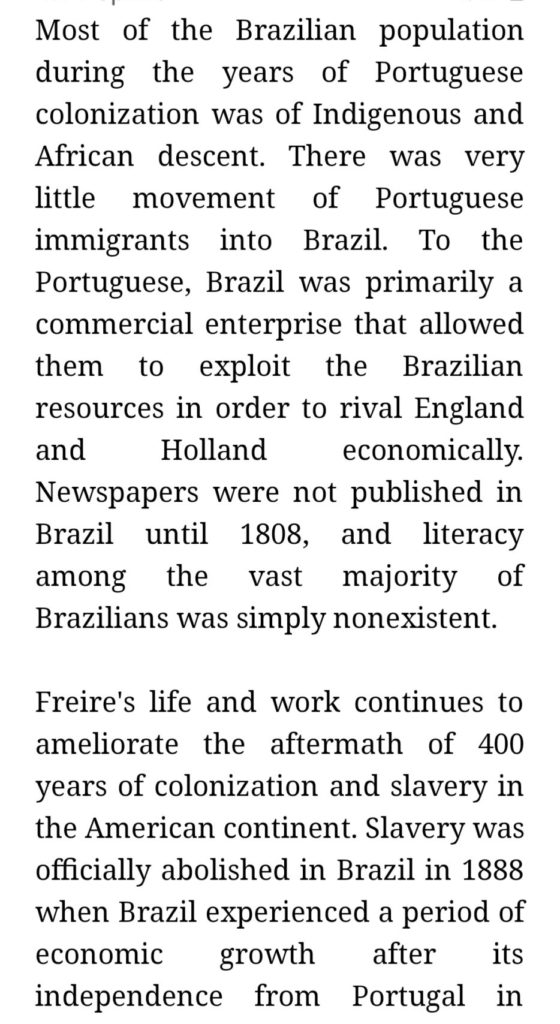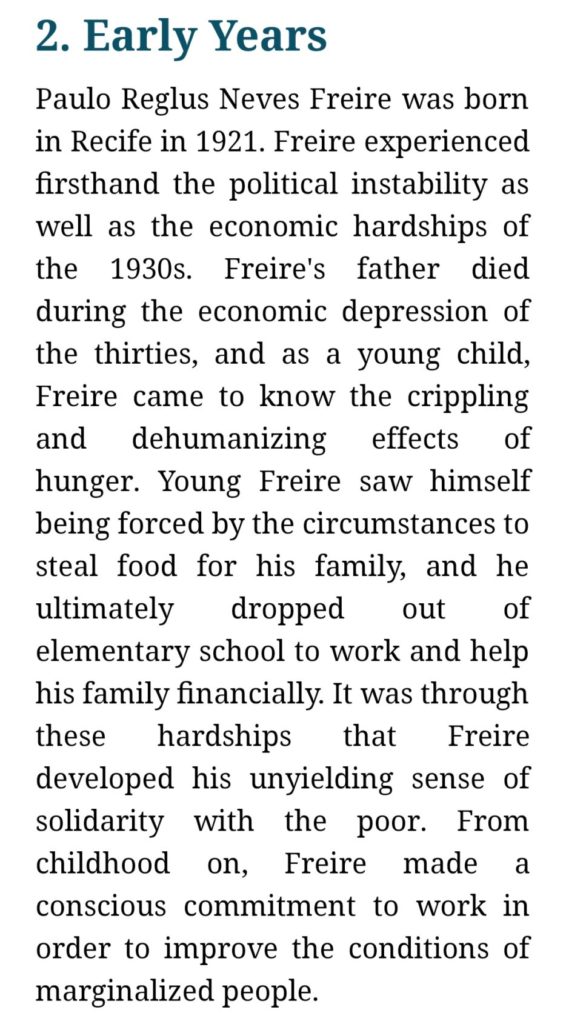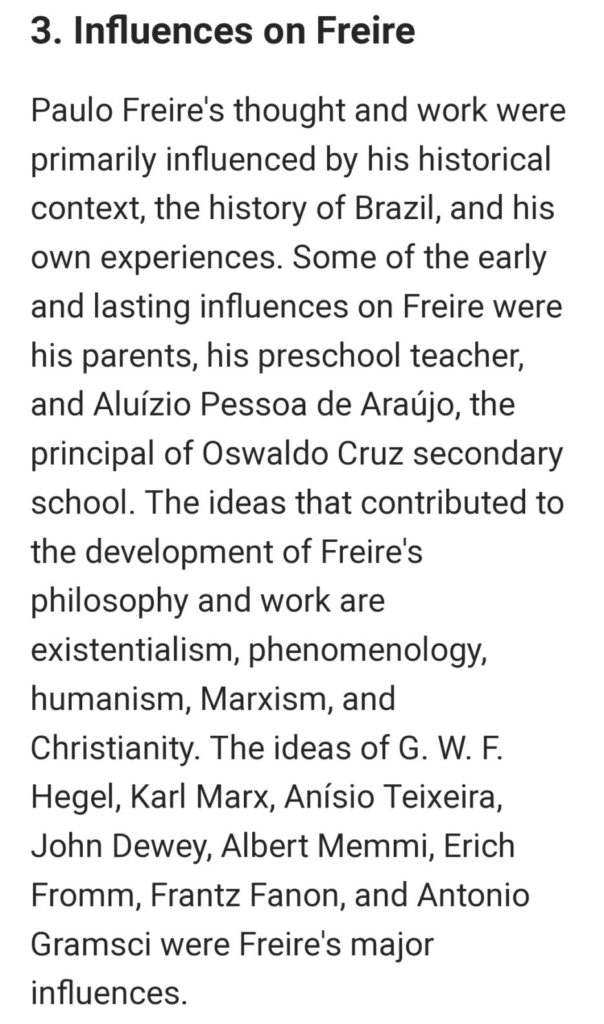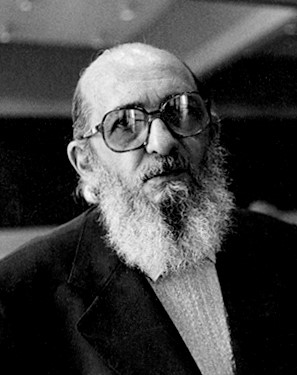Here’s an ad that’s referenced in one of this week’s readings.
Category Archives: Posts
THEORY + Critical Pedagogy
Pursuant to the prior week’s theme of CONTEXT it’s important to establish context for this week’s framework — THEORY — in regard to the critical pedagogues, such as Paolo Freire and bell hooks, who we’re reading. Freire wrote and tirelessly advocated for “the oppressed” and toward pedagogies for the oppressed and for freedom in colonized Brazil. I’d describe Freire as a META-theorist. Here are screen shots from the Internet Encyclopedia of Philosophy (A Peer-Reviewed Academic Resource) about Brazil’s history and Freire’s early career:


The first time I read Freire was three years ago for ITP Core I at the GC (now called Digital Pedagogy I) as a non-matriculated student. I approached it with the openness that often accompanies auditing a course and I found him a bit hard to follow. This time, having obtained the ITP Certificate and two years in to the MA in DH at the GC, and also teaching Eng 101 and 201 at BMCC, I “get” him. I can now relate to Freire’s observation that “education is suffering from narration sickness.” (p. 71, Pedagogy of the Oppressed) This sentence from the opening paragraph of Chapter 2 continues as Freire further observes that “education thus becomes an act of depositing, in which the students are the depositories and the teacher is the depositor” (p. 72) thereby laying out his “‘banking’ concept of education” or what has come to be called the “banking model” of education.
Not wanting to suffer from ‘narration sickness’ nor embody the ‘banking model’ myself as I teach, I’m very interested in performative knowledge and I effort toward collaborating with my students wherever and whenever possible. For example, at BMCC the Eng 101 syllabus is a template written for instructors that we must use (a characteristic of the “banking model”) AND the content of the final exam and the instructions for administering the exam are “given”, i.e., dictated to us instructors (def. “banking model”!) So, I “humanized” these two aspects of my teaching by bringing in a guest speaker/colleague to talk with my Eng 101 class about the content of the final exam, which engaged my students in astonishing ways and which my colleague truly enjoyed. In Eng 201, we may write our own syllabus and we’re not required to give an in-class final exam. Therefore, I’ve decided to have the final exam be a final paper that my 201 students and I create together so that we can use the time to focus on their individual writing styles in their interest areas (in consultation with me).
While I’m not sure what I’m practicing in the classroom would be defined by purists as “critical pedagogy”, I aspire to it as “the antithesis to the banking model of education” (p. 24 Duncan-Andrade and Morrell, The Art of Critical Pedagogy) in my own practice of pedagogy. While my teaching may not yet rise to the level of “reading the word and world” (p. 27, Duncan-Andrade and Morrell, citing Freire & Macedo) I’m committed to praxis, “problem-posing education”, and “learning for freedom rather than learning to earn” because “a humanizing education that develops a critical literacy for students and teachers” (p. 27) is, in my opinion, the only way to go in our current culture. Furthermore, bell hooks’s “critical challenge” ethos is vital to this. In the Introduction to Teaching to Transgress, hooks talks about Freire’s great influence on her: “When I discovered the work of Brazilian thinker Paolo Freire, my first introduction to critical pedagogy, I found a mentor and a guide, someone who understood that learning could be liberatory.” (p. 6) While hooks admittedly adopts Freire’s “pedagogical paradigms” she also challenges his ideas. Therefore, it might be worth noting Friere’s influences in order to grasp an even broader context for hooks’s critique of Freire:

hooks also notes about her own trajectory: “Already deeply engaged with feminist thinking, I had no difficulty bringing that critique to Freire’s work.” (p. 6, Teaching to Transgress)
As my own particular academic interests and areas of scholarly inquiry include cultural studies, an area of overlap with the critical pedagogues such as Freire and hooks, I ask us all to consider:
What types of interactive assignments or supplements to course content might we develop and implement or are already using?
What is your critical pedagogy “dream” assigned work or in-class activity…?

Contextualizing Contexts: Time, Space, Culture…
I’m not really ready to post my response to this week’s readings, since I’m still processing a lot of new information and perspectives. And I’ve not yet finished reading The Innovative University, partly because I find it’s commercial premise so distressing. But, since I’m running out of time to post this by monday morning…. I’ll try to pin down and extract some of my swirling thoughts. And consider our readings in terms of temporal, spatial, and other categories of contexts.
TIME
A number of the readings were self-reflective about Ed. Tech.’s limited self-reflectiveness about its history. This seems to be partly a function of its interdisciplinarity, and the fact that ed. tech is often a secondary, instrumental, discipline for academics engaged in it, and partly a function of a continued sense of novelty, of always being on the verge. [*edit: this explicit in Weller]. I found Watters (on Teaching Machines) and Fletcher to be particularly helpful for contextualizing ed. tech. within the history of developments in visual technology in the 20th century, and Weller and Downes for zooming in to late-20th – 21st century web technology.
This pull-quote from Watters links to our Week 1 topic of “Definitions”:
“It’s difficult to pinpoint “the first” teaching machine. It depends, of course, on how you define such a thing.”
More generally, I appreciate how the authors are attentive to context, and self-reflective about their sensitivities. Thus, Watters description of her planned book: “Teaching Machines, under contract with MIT Press, chronicles the history of this century-old belief that the automation of education is necessary (and is surely coming any day now)”, and the fact that she maintains a blog about it. At the same time, she is efficient about using visual clues and tech conventions to supply context. A snapshot of the timeline illustrates:

SPACE
My impression is that our readings are primarily focused on the U.S. (though this might be a misimpression, reflecting my own inattention).
Some of the readings touch upon primary and secondary education, but most are about the university, and a bit about possible substitutes or supplements to the conventional US university.
I found Fletcher and McMillan Cottom particularly useful for spatial contextualization, partly figuratively, in their discussion of ecosystems and platforms.
My attempt to think about spatial context is invariably intertwined with the sociology of space, and so, to….
CULTURE
CLASS & ECONOMICS
McMillan Cottom’s grappling with demographic realities and pragmatism is encouraging for thinking about adaptation of pedagogy to the real world. ( As above, I am finding Skim Christensen and Eyring depressing and distressing).
I appreciate that many of the readings push back against technological utopianism.
Number 31 in Watters’ list of debacles resonates very strongly for me, The Gentrification of Sesame Street. Because the blend of good and bad, the co-opting of good for bad, can be so subtle sometimes, so challenging. As Wellers says of social media, “What we are now wrestling with is the paradox of social media: the fact that its negatives and its positives exist simultaneously.”
ETHICS
Privacy, metrics, open-source, again the class & economics issues….
RHETORIC
a couple of random observations:
I was a bit put off at first by some of Watters’ anger:
“I decided to do something similar: chronicle for you a decade of ed-tech failures and fuck-ups and flawed ideas.
Oh yes, I’m sure you can come up with some rousing successes and some triumphant moments that made you thrilled about the 2010s and that give you hope for “the future of education.” Good for you. But that’s not my job. (And honestly, it’s probably not your job either.)”
I wrote in my notes:
I’m not sure what she’s getting at with “job”, but why not? Why does everything need to be polemic? I’m all for ditching the alleged objectivity and neutrality of “modern science” including tech, or for seeking fairness in “balance”, but I think that a positive aspect of post-modernism is to permit and enable critical thinkers to move beyond being “for or against”; more precisely, to stand aside from argumentation, to give fair representative well-rounded reports and evaluations as a basis for impassioned advocacy.
But i think i welcome the voice of Cassandra alongside some of the more neutral voices we read.
Part of what disturbs me about Christensen and Eyring is what feels to me to be reductive pandering to our metrics-based society; Harvard as the benchmark; Hermann Hesse summarized as “Nobel Laureate”.
CONNECTIVISM
One of the challenges raised for me in this week’s readings is the value of non-obvious contextualization. This reminded me of a reading from last semester’s Intro to DH course, Stephen Ramsay’s The Hermeneutics of Screwing Around; or What You Do with a Million Books.


